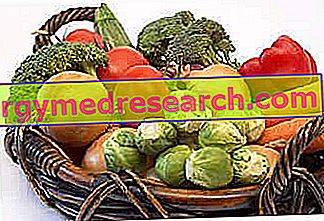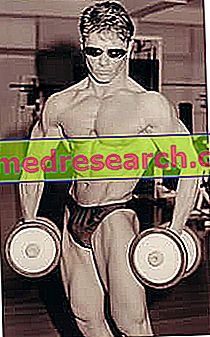By Doctor. Gianluca Rizzo - Nutritionist
Creatine
Another aspect of great interest for athletes is the intake of creatine.

Our body can synthesize creatine but the enzymatic capacity is limited, implying the need for a dietary intake to keep cellular reserves high. Although creatine supplementation is very common among power athletes, regardless of their omnivorous or vegetarian diet, it often happens that this is not a very useful custom, since a balanced omnivorous diet can fully satisfy their needs. Furthermore, various factors intervene in the modulation of creatine deposits which imply a strong genetic dependence. For this reason, in some individuals, creatine supplementation cannot increase the volume of deposits even more, nor can it cope with a lack due to a subjective predisposition.
Creatine is distributed among foods of animal origin especially in red meat. There are no sources of creatine among plant foods and this could imply an advantage in the integration by vegetarians, as has been shown in cycles of intake of 20-25g of creatine (5g for 4-5 times a day), for 5-6 consecutive days; the intake program can also be done with 3g / day but should not exceed 8 weeks. Despite the theoretical aspects, a lack of vegetarian sports has not yet been unequivocally demonstrated and the integration between sedentary vegetarians or non-competitive and aerobic levels of physical activity seems irrelevant. While in the short term it seems to reduce recovery times by increasing performance in intense and close-up efforts, and reducing the feeling of tiredness, in the long term creatine can promote the deposition of muscle mass with disadvantageous effects for endurance athletes. In any case, there are still no long-term data on supplementation that guarantee its safety; in cases of renal dysfunction, its use is strongly discouraged.
Proteins and Protein Requirement
The athlete's protein needs are perhaps the most discussed issue, and with discordant theories, which have always split ideologies on the nutritional approach of sportsmen and trainers. The proteins act as a base material for the deposition of other muscle mass which, especially in the absence of a sufficient proportion of essential amino acids, could be severely limited. While it has now been demonstrated and clarified that in the average adult the vegetarian's protein requirements can be easily satisfied without resorting to particular precautions (such as the now outdated idea of the complementation of cereals and legumes), there is still a strong confusion linked to the needs of the sportsman, omnivorous or vegetarian. There is no unquestioned and unequivocally demonstrated approach to protein proportion but current biochemical knowledge may suggest how to satisfy protein requirements, avoiding surplus or insufficiency. Protein requirements are often referred to as an independent index linked to the type of physical activity; it is considered that an average individual should introduce 0.8 g / kg of body weight of protein, a requirement that can increase up to 1.8 g / kg in power athletes. In reality the big mistake is to underestimate, in this context, the caloric needs that represent the first index to consider. Starting from the caloric value calculated according to the real needs of the athlete, the protein quota should be calculated according to the proportions established by the numerous epidemiological studies. Thus 12-15% of proteins, compared to the total caloric quota, will foresee a quantity of protein directly proportional to the caloric value. In this way you will not incur the risk of caloric overload (in the case of protein calculation and caloric balance in relation to this), or of renal overload (in the case of protein calculation and independent caloric balancing with an increase in the percentage of proteins). Protein intakes above 2g / kg per day have not been shown to be favorable for muscle deposition and have been linked to loss of bone calcium, renal dysfunction and cardiovascular problems.
Despite the share of essential amino acids introduced by the diet has recently been linked to the genesis of some tumors, in the sportsman it represents a point of regulation of protein synthesis in response to catabolic hormonal stimuli. All plant foods tend to have a lower share of essential amino acids than animal foods. Precisely for this reason, especially in the case of very high demands, it will be useful for the vegetarian sportsman to use particularly rich protein sources, such as soy-based preparations, which do not have amino acid deficiencies and allow the regular promotion of protein synthesis. While the promotion of muscle deposition can be counterproductive in the endurance athlete, which for this reason should never exceed 1.4 g of protein per kilogram of body weight, in that of power it is also maximized through the use of specific amino acids widely studied for their ergogenic and anabolic capacity in skeletal muscle. These amino acids are called branched due to their aliphatic side chain (val, ile, leu) and are part of the essential ones because they cannot be synthesized by our organism. In bodybuilders their intake is often in the form of supplements or foods such as milk, egg white, whey or casein extracts. In the case of vegans, the only significant source of branched amino acids is soy in the form of degrassed thermoplastic proteins or soy protein extracts (isolated soy protein). These proteins are notoriously lacking from the point of view of the amino acidic framework, but they have a limited efficiency of nitrogen utilization and a limited digestibility. Recent studies on the supplementation of branched amino acids have revealed how the effect of these amino acids could actually be the exclusive prerogative of leucine alone. In this case the best source for omnivores could be whey while for vegans it would be enough to reach the quota of at least 3-4g of leucine per meal and, where not reached, provide for specific supplements (its oxidation is particularly high during endurance physical activity). Excessive intake of branched amino acids compared to requirements could worsen performance among endurance athletes due to the increase in muscle mass. The most common sources in the vegetarian diet can be sesame seeds, sunflower seeds, tofu and pumpkin seeds.
The importance of not achieving the caloric share and its catabolic effect on the body's proteins is often underestimated. As it is true that the levels of plasma proteins give us a clear signal of the nutritional adequacy of an individual, in the vegetarian and above all vegan athlete it is easy for the scarcity of dense foods to affect the tendency of these individuals to fail to reach muscle potential . As in adolescence, in sports the calorie requirement must be satisfied with sufficiently concentrated foods (soy protein, pea and hemp flour, wheat germ and dried fruit, rice proteins), which are at the same time rich in the necessary proteins . Let us not forget that these foods are rich in calories and proteins but poor in micro elements and that for this reason they must not completely replace whole foods. Although the timing of carbohydrates is of fundamental importance for a good performance and a good recovery, the caloric share of a professional sportsman can easily be underestimated. An athlete of 68 kg strength may need 3600 Kcal with 120g of protein (~ 13%, 1.8g / Kg); an athlete of 91 kg might need 4800 Kcal with 160g of protein (~ 13%, 1.8g / Kg); each with a 4 hour physical training per day (at the bottom of the next article is an example of a vegetarian food plan for each).



